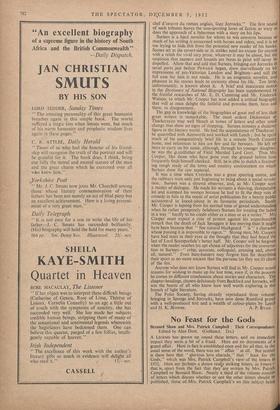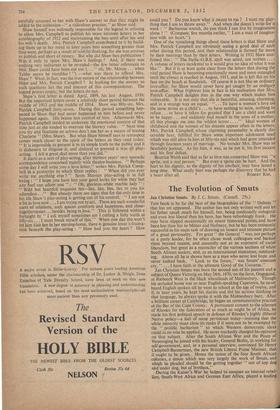No Feast for the Gods
Bernard Shaw and Mrs. Patrick Campbell : Their Correspondene4 Edited by Alan Dent. (Gollancz. 21s.) A LEGEND has grown up round these letters, and on immediat impact they seem a bit of a fraud. Here are no documents of a grand affair. Here in fact is established once and for all that, in the usual sense of the word, there was no " affair " at all. But neither is there here that " glorious love charade," that " feast for the Gods," wh:ch was Mrs. Patrick Campbell's view t of the letters i 1932. Here are perhaps a dozen really striking letters, as letters-- that is, apart from the fact that they are written by Mrs. Patrick Campbell or Bernard Shaw. Nearly a third of the volume consists of letters which discuss whether or not the other letters should be published, those of Mrs. Patrick Campbell's on this subjxt being carefully returned to her with Shaw's answer so that they might be added to the collection—" a ridiculous practice," as Shaw said.
Shaw himself was indirectly responsible for the legend in refusing to allow Mrs. Campbell to publish his more intimate letters in her autobiography of 1922 and maintaining the ban until after his and his wife's death. Mrs. Patrick Campbell contributed to it by build- ing them up in her mind in later years into something greater than they were, perhaps as a result of wishful thinking, for she was anxious to publish and short of money. But why did Shaw ban publication ? Was it only to spare Mrs. Shaw's feelings ? And, if there was nothing very indiscreet to be revealed—the few bitter references to Mrs. Shaw could have been cut out (... " oh, Mr. Mouse. . . when Tabby mews he trembles ! ") —what was there to offend Mrs. Shaw ? What, in fact, was the true nature of the relationship between Shaw and Mrs. Patrick Campbell ? In looking for the answer to such queStions lies the real interest of this correspondence. The legend proves empty, but the letters do not.
Shaw's first letter is dated April, 1899, his last August, 1939. But the important letters cover a relatively short period between the middle of 1912 and the middle of 1914. Shaw was fifty-six, Mrs. Patrick Campbell forty-seven. During this period something hap- pened to Shaw that had never happened to him before and never happened again. His brains lost control of him. Afterwards Mrs. Patrick Campbell tended to underrate the emotional content of that time just as she tended to overrate the literary value. " Next time you try and fascinate an actress don't use her as a means of teasing Charlotte "(Mrs. Shaw). But what Shaw himself says in retrospect comes much closer to the spirit of the letters as they read today. " It is impossible to present it in its simple truth to the public and it is dishonest to disguise it, and disloyal to pretend it was all play- acting. I felt a great deal more than you did."
It starts as a Sort of play-acting, after thirteen years' very sporadic correspondence concerned mainly with theatre-business. " Perhaps some day I will write you a love letter," writes Mrs. Patrick Camp- bell in a postscript to which Shaw replies : " When did you ever write me anything else ? " Soon Shavian play-acting is in full twing : "1 hope you have lost your good looks for while they last any fool can adore you " ; " Oh, glorious white marble lady " Wild but heartfelt exquisite lies—lies, lies, lies, lies to you his adoredest ..." But already there are signs that for the only time in his life Shaw's play-acting is getting out of his control. "lam not a bit in love now . . . I am trying not to act. There are such wonderful sorts of relations, such quaint comforts and happiness, and close- togethernesses ... besides being in love." This is followed within a fortnight by "I ask mySelf sometimes am I cutting a folly tooth at fifty-six ... I must break myself of this." When one day she won't let him Visit her in her nursing-home, there is genuine lover's frustra- tion beneath the play-acting : "How had you the heart ? How could you ? Do you know what it means to me ? I want my play thing that I am to throw away." And when she doesn't write for week : "Barbarous wretch, do you think I can live by imaginatioi alone ? " (Compare, five months earlier, " I am a man of imagina tion with no heart.") One of the tantalising things about these letters is that Shaw an Mrs. Patrick Campbell are obviously seeing a good deal of eacl other during this period, and their relationship is formed far mort by their meetings than by their letters. Writing in 1932 Shaw con firmed this : "The Stella–G.B.S. idyll was acted, not written ... A volume of letters incidental to it would give no idea of what it wa! like." But it is at least quite clear from the letters that during fie( vital period Shaw is becoming emotionally more and more entangle( until the climax is reached in August, 1913, and he is left fiat on hi: face on the beach at Sandwich. Of course it is not like an ordinar3 love-affair, for Shaw would never have got caught by an ordinar3 Jove-affair. What frightens him in fact is his realisation that Mrs Patrick Campbell delights him in the one way which makes hirr vulnerable. It is not only that she is beautiful, amusing, charming and in a strange way an equal. "... To have a woman's love or
the same terms as a child's to have nothing to seize, nothing tc
refuse to have it taken for granted that I am a child and want to be happy. ... and suddenly find myself in the arms of a mother all this plunges me into the wildest terror. ...." Ideal women ol childhood and the women of his dreams appear often in the letters Mrs. Patrick Campbell, whose charming personality is clearly dis. cernible here, fulfilled for Shaw some important adolescent need which was still alive in him at fifty-six and which had gone untended through fourteen years of marriage. No wonder Mrs. Shaw was sc fiendishly jealous. As for him, it was, as he put it, his first success and his first defeat.
Beatrice Webb said that as far as love was concerned Shaw was "v sprite, not a real person." But even a sprite can be hurt. And the hurt to his dignity, to the dignity of his intellect, may have lasted v long time. What really hurt was perhaps the discovery that he had
a heart after all. ROBERT Km.



















































 Previous page
Previous page